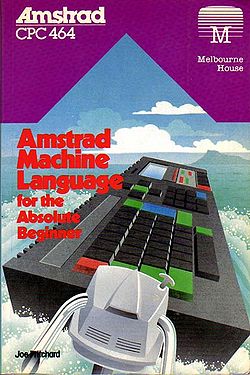Difference between revisions of "Amstrad Machine Language for the Absolute Beginner"
(→Review) |
|||
| Line 102: | Line 102: | ||
lf you are involved in programming the Amstrad CPC464 then you must have this book. | lf you are involved in programming the Amstrad CPC464 then you must have this book. | ||
| + | |||
| + | == Contents == | ||
[[Category:Books]] | [[Category:Books]] | ||
Revision as of 10:12, 7 July 2008
Contents
Information
| Title: | Amstrad Machine Language for the Absolute Beginner |
| Authors: | Joe Pritchard |
| Publiser: | Melbourne House |
| Year: | 1985 |
| Pages: | 154 |
| ISBN: | 0-86161-193-4 |
Contents
1. Machine Code First Principles
5. Passing Parameters to programs
8. 16 bit arithmetic and counting
9. Loops, Jumps and Block Operations
10. Ins and Outs and Odds and Ends
11. Amstrad Sound
Appendix 1: Instructions and OP-codes
Appendix 2: Flag Operation Summary
Appendix 3: Numbers on the Amstrad
Review
This book is the definitive guide for all serious programmers on the Amstrad CPC464. Don Thomasson has examined every aspect of the Amstrad — its peripherals, the ROM and the RAM routines. This book contains a breakdown and expianation of all of the following:
Memory Map, Windows
Input/Output Map, Matrix data
Outer Peripherals, Text output
Jumpblock Entries, Graphics VDU
RAM routines, Keyboard routines
Main Reset, Input routines
Printer routines, Keylcode table
Interrupt Handler, Break functions
Event System, Cassette messages
Screen RAM, Cassette routines
Streams, Cassette calls
Parameters, File types
Mode control, Sound calls
Addresses, External ROM command words
Inks, External ROM routines
Flash System, BASIC routines
General routines, BASIC interpreter
Colour
All of the routines available in the Amstrad are detailed with explanations and tables, as weIl as Information on how to use the routines.
The book also contains a guide to all possible ROM configurations. The appendices include two programs that will allow you to examine the routines in the Amstrad and test various parameters.
lf you are involved in programming the Amstrad CPC464 then you must have this book.
